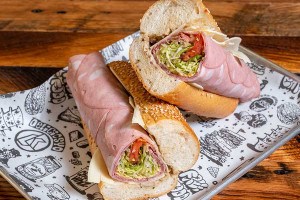Your Brother Is Your Keeper, And Your Cook: Five More Days in Southeast Sulawesi
Over at phillymag.com, in this month’s Revisit, Trey Popp pays a visit to Hardena Waroeng Surabaya Restaurant–an unlikely workingman’s Indonesian restaurant buried in the heart of South Philly. His meal there reminded him of one of his most memorable dinners ever: eaten while on the road in Sulawesi, stuck (as one so often gets) between here and there.
Our plan to travel from Kendari to Lake Poso—a crow’s flight of about 200 miles from the southeast tip of the island of Sulawesi to its central highlands—had already proven unusually quixotic. Merely reaching the starting point had required 24 straight hours of bus and boat travel, which delivered us to a town where the heat was ghastly, English-language newspapers were unavailable, and when I tried to call home from the main telecommunications office, I was told that all the phones were broken. Our Lonely Planet guidebook made no mention of Kendari or any other part of the province of which it was the capital. This seemed justified. One got the impression that nothing had ever happened here and nothing ever would.
Come to find, Trey was wrong about that last part. Here is a continuation of the story of his travels in Indonesia.
After dinner we sat outside with Abdul, talking about politics. An old radio crackled out news with a high level of distortion. Abdul repeated the top story slowly for our benefit. Chaos had erupted in East Timor. Eighteen thousand people were fleeing. There was no further information.
Olivia and I slept intermittently on Abdul’s hard wooden bed until three o’clock in the morning when the roosters started to go berserk. We rose at five-thirty, drank tea and ate a breakfast just like the previous night’s dinner: rice and dried fish and noodles. After thanking Abdul for his hospitality, we began walking in the already suffocating heat.
It was 7 a.m.
Five minutes from Abdul’s front door, a flatbed truck came along. In the back were eight young men, a few burlap sacks, some bananas and coconuts, several bundles of wood, two blue 55-gallon drums, and a pair of crutches. We wedged our legs into crannies among the cargo and the truck forded four streams in the space of an hour before halting at a fifth, which marked the end of cultivated land. We set out again on foot. It was 9 a.m. now, and we hoped to make Buleleng by noon because the men in the truck had assured us there would be an outgoing bus. From there, we guessed it would be an easy hour or two to Lake Poso, our ultimate destination.
This was not to be. Olivia, we discovered, had left her money and passport under Abdul’s bed, which meant a nice morning jog for me—back fifteen miles down the road we’d just traveled, across five streams. Fortunately, my run ended after just two miles rather than the full half-marathon—interrupted by a motorcycle that came puttering up from the other direction. As it drew close, Abdul’s grinning face appeared behind the driver. He’d discovered the unintentional offering beneath his bed as well. He handed it back, we said goodbye all over again, and I set off down the road once more—one invaluable document (and a few bucks) the richer, two hours the poorer.
On the far side of the stream where the flatbed had stopped, the road shrunk to a steeply pitched byway through jungle. Butterflies emerged at midday in bewildering variety: red and orange, blue, white, black and hot pink, all spiraling after one another in tornadoes of color. Further along the path we found patches of fur and mammalian feces—jungle landmarks amid the green and storms of butterflies. After some time four men in an offroad jeep came up behind us invited us aboard. They were from Jakarta, and one of them spoke English well. The feces, he told us, had likely been deposited by an animal locally known as anoa, which he translated as jungle buffalo.
“Are they small?” Olivia asked.
“No! About 750 centimeters high!”
“Are they dangerous?”
“Yes! Very dangerous!”
“And I saw some little black animals that looked like pigs,” Olivia continued. “Are there pigs here?”
“Wild boar.”
The jeep had to stop after ten minutes. A tree was down over the road, which had in any case become too narrow for a four-wheeled vehicle to press on much further. All of us got out and walked. The men, as it turned out, were scouting potential logging sites. At that time, some 29 million cubic meters of timber were being felled in Indonesia every year.
The footpath narrowed further and the canopy closed in. We came across a pile of iridescent feathers. A little further up we found a pile of bones and vertebrae. There was more anoa feces. Something was eating well, but it sure wasn’t us. The men turned back at a certain point, but we continued on. The trees pulsed with birdsong and unseen life. The trail led ever uphill. Hours passed and we ran out of water. Streambed after streambed was dry. We kept walking. All around us, the jungle hummed.
We were still walking through deep jungle at twilight and with the darkness came desperation. We’d been short of water for far too long and were walking on empty stomachs—our breakfast of fish and noodles just a distant memory. Crouching in the murky dark, I scooped some of the contents of a tiny trailside puddle into my empty water bottle, sweeping aside the small spiders that dotted the surface. I didn’t drink it, though. Not yet.
Fortunately, we didn’t need to. As night blacked in the world around us we reached a ridgeline and finally began descending down the other side behind the beams of our flashlights. At last, we arrived at a river. Buleleng remained out of sight, but the footpath had widened back into a road. Olivia proposed to walk ten minutes further while I filtered water to see if the village presented itself.
Twenty minutes later she returned. She had seen a woman walking with a child, holding a candle aloft to light their way. Olivia, placing her palm over her headlamp so that the light spilled down her pale face and illuminated the alien tresses of her long red hair, had approached the candle-lit pair and, polite as can be, said good evening.
Whereupon the woman clapped her hand over her baby’s eyes, screamed, and fled at a full sprint with the child under one arm.
We went to sleep on the riverbank, without a tent, beneath a moonless and star-freckled sky.
Check in tomorrow for more of Trey’s story, including how he and Olivia became celebrities in Buleleng, accidentally help to open a trade route in Bungku, and finally make it back to civilization–or at least some place with restaurants.


